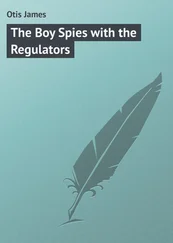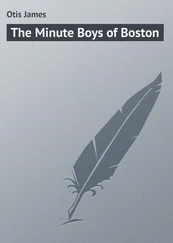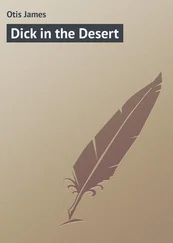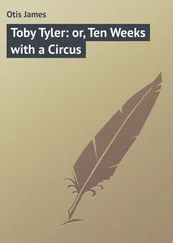James Otis - Off Santiago with Sampson
Здесь есть возможность читать онлайн «James Otis - Off Santiago with Sampson» — ознакомительный отрывок электронной книги совершенно бесплатно, а после прочтения отрывка купить полную версию. В некоторых случаях можно слушать аудио, скачать через торрент в формате fb2 и присутствует краткое содержание. Жанр: foreign_prose, на английском языке. Описание произведения, (предисловие) а так же отзывы посетителей доступны на портале библиотеки ЛибКат.
- Название:Off Santiago with Sampson
- Автор:
- Жанр:
- Год:неизвестен
- ISBN:нет данных
- Рейтинг книги:4 / 5. Голосов: 1
-
Избранное:Добавить в избранное
- Отзывы:
-
Ваша оценка:
- 80
- 1
- 2
- 3
- 4
- 5
Off Santiago with Sampson: краткое содержание, описание и аннотация
Предлагаем к чтению аннотацию, описание, краткое содержание или предисловие (зависит от того, что написал сам автор книги «Off Santiago with Sampson»). Если вы не нашли необходимую информацию о книге — напишите в комментариях, мы постараемся отыскать её.
Off Santiago with Sampson — читать онлайн ознакомительный отрывок
Ниже представлен текст книги, разбитый по страницам. Система сохранения места последней прочитанной страницы, позволяет с удобством читать онлайн бесплатно книгу «Off Santiago with Sampson», без необходимости каждый раз заново искать на чём Вы остановились. Поставьте закладку, и сможете в любой момент перейти на страницу, на которой закончили чтение.
Интервал:
Закладка:
James Otis
Off Santiago with Sampson
CHAPTER I.
"KEEP OUT."
It was a small but by no means feeble-looking boy who stood in front of a driveway disclosed by the opening of huge gates which, until they had been swung inward, appeared to have been a portion of the high fence of boards.
There was seemingly no inducement for a boy to linger in this vicinity, unless, indeed, it might have been the sign posted either side the gate, on which was painted in letters rendered conspicuous because of the vivid colouring, the forbidding words, "Keep Out."
"I'll not keep out 'less I'm minded to, an' him as can hold me this side the fence needs to be spry on his feet," the small boy said, half to himself, and with a gesture of defiance which told he had not been accustomed to obeying commands that might be evaded.
Through the gateway nothing could be seen save enormous heaps of coal, some enclosed in pens formed of planks as if to prevent them from mingling with the others, and between all a path or road of no more than sufficient width to permit the passage of a cart. In the distance, a rough building abruptly closed the view, and beyond it the puffing of steam and rattle of iron implements told of life and activity.
Outside the fence, it was as if this certain portion of the city had been temporarily deserted; but one could hear the rumble of wheels over the pavements on either hand, giving token that the coalyard was situated just beyond the line of city traffic.
The boy gazed into the uninviting-looking place as if fascinated, only glancing up now and then at the signs which mutely forbade his entrance, and, as if unconscious of his movements, stole slowly nearer and nearer the gateway until he stood directly on the line that separated the yard from the sidewalk.
"If I wanted to go in, it's more'n a couple of signs that could keep me out," he muttered, threateningly, and then, with one backward glance to assure himself that no unfriendly policeman was watching from the distance, the boy darted forward, taking refuge behind the nearest heap of coal, lest an enemy should be lurking near at hand.
Save for the hum of labour everywhere around, he heard nothing. No guardian of the smutty premises appeared to forbid his entrance, and after waiting a full minute to make certain it was safe to advance yet farther, he left one place of partial concealment for the next in his proposed line of march.
So far as he could see, there was no other guardian of the yard save the two signs at the entrance, and the only purpose they served was to challenge him.
Grown bolder as the moments passed without bringing to light an enemy, the lad advanced more rapidly until he stood, partially concealed by one of the pens, where it was possible to have a full view of all that was being done in this place to which the public were not supposed to be admitted.
If the intruder had braved the unknown dangers of the yard simply in order to gratify his curiosity, then had he paid a higher price than the view warranted.
The building, which from the street appeared to mark the end of the enclosure, was a structure wherein puffing engines, grimy men, long lengths of moving chains, and enormous iron cars or boxes were sheltered from the sun or rain. In front of it a wooden wall extended down into the water, – a pier perhaps it might be called, – and at this pier, held fast by hemp and iron cables, lay a gigantic steamer built of iron.
The intruder gave no heed to the busy men and machinery within the building. The vessel, so powerful, but lying there apparently helpless, enchained his attention until he had made mental note of every spar, or boat, or cable within his range of vision.
Then, suddenly, from somewhere amid the chains, and cars, and puffing steam, came the shrill blast of a whistle, and as if by magic all activity ceased.
The engines no longer breathed with a heavy clank; cars and chains came to a standstill, and men moved quietly away here or there as if having no more interest in the hurly-burly.
One of the weary labourers, his face begrimed with coal-dust until it was not possible to distinguish the colour of his skin, took from its near-by hiding-place a dinner-pail, and came directly toward where the small boy was overlooking the scene.
Within two yards of the lad the dusty man sat down, brushed the ends of his fingers on his trousers, rather from force of habit than with any idea of cleansing them, and without further delay began to eat his dinner.
The boy eyed him hungrily, looked around quickly to make certain that there were no others dangerously near, and stepped out from behind his screen of coal.
"You'd better keep an eye out for the watchman," the man said, speaking indistinctly because of the bread in his mouth, and the boy replied, defiantly:
"I'd like to see the watchman 'round here that I'm 'fraid of, an' besides, he couldn't catch me."
"What'er you doin' here?"
"Nothin'."
"A boy of your size has got no business to be loafin' 'round doin' nothin'."
"I might be eatin' if I had a chance; but there hasn't been much of an openin' for me in that line this quite a spell."
"Hungry?"
"Give me a piece of that bread an' I'll show yer."
"Don't you do anything for a livin'?" the man asked passing the lad a generous slice from the loaf.
"Course I do."
"What?"
"Anything that pays. I've sold papers some since the Spaniards got so funny; but it ain't any great snap, only once in awhile when the news is humpin' itself. A feller gets stuck mighty often, an' I'm thinkin' of tryin' somethin' else."
"Where's your folks?"
"I ain't got any to speak of now, since my father got giddy an' went off to war."
"Out for a soldier, eh?"
"Not a bit of it! He shovels coal aboard one of them big steamers that's down smashin' the life out'er Cuby, that's what he does, an' he's nobody's slouch, dad ain't!"
"What's your name?"
"Teddy Dunlap."
"Want more bread?"
The boy leaned over in order to look into the dinner-pail, and then said, promptly:
"I've had enough."
"Don't think you're robbin' me, 'cause you ain't. I believe in feedin' well, an' this is only my first pail. There's another over there that I'll tackle later."
Teddy glanced in the direction pointed out by his new acquaintance, and, seeing a pail half concealed by some loose boards, at once stretched out his hand, as he said:
"If you've got plenty, I don't care if I do have another piece of that bread."
"Can't you earn enough to keep you in food?" and the man gave to the boy a most appetising sandwich.
"Say, that's a dandy! It's half meat, too! Them you get down-town don't have more'n the shadow of a ham bone inside the bread! Course I make enough to buy food; but you don't think I'm blowin' it all in jest for a spread, eh?"
"Runnin' a bank?"
"Well, it's kind'er like that; I'm puttin' it all away, so's to go down to Cuby an' look after the old man. He allers did need me, an' I can't see how he's been gettin' along alone."
"Where's your mother?"
"Died when I was a kid. Dad an' me boomed things in great shape till he got set on goin' to war, an' that broke it all up."
"Did he leave you behind to run wild?"
"Not much he didn't, 'cause he knows I can take care of myself; but he allowed to make money enough so's we could buy a place out in the country, where we'd have an imitation farm, an' live high. Oh, I'm all right, an' every time I catch a sucker like you there's jest so much more saved toward goin' down to Cuby. You see I never did take much stock in dad's kitin' 'round fightin' Spaniards, an' since he left it seems as if I was mighty foolish to let him go, so I'm bound to be where he is, when things come my way."
Читать дальшеИнтервал:
Закладка:
Похожие книги на «Off Santiago with Sampson»
Представляем Вашему вниманию похожие книги на «Off Santiago with Sampson» списком для выбора. Мы отобрали схожую по названию и смыслу литературу в надежде предоставить читателям больше вариантов отыскать новые, интересные, ещё непрочитанные произведения.
Обсуждение, отзывы о книге «Off Santiago with Sampson» и просто собственные мнения читателей. Оставьте ваши комментарии, напишите, что Вы думаете о произведении, его смысле или главных героях. Укажите что конкретно понравилось, а что нет, и почему Вы так считаете.












